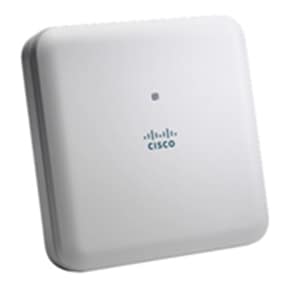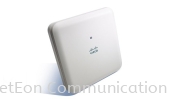- Wi-Fi Access Points
- Routers
- Outdoor Wireless Radio
- Industrial Network Switches
- Enterprise Network Switches
- Accessories
- Access Control
- Campus Network Switch
- CCTV Surveillance System
- Cloud Managed AP
- CYBER SECURITY
- Gateway
- SMB Network Switches
- Others
Cisco Business 1830 Wi-Fi Access Points
| Previous | 4 / 9 | Next |

Figure 1.
Cisco Aironet 1830 SeriesProduct overview
Ideal for small and medium-sized networks, the Cisco® Aironet® 1830 Series delivers industry-leading wireless performance with support for the latest Wi-Fi standard, IEEE’s new 802.11ac Wave 2 specification, and meets the growing requirements of wireless networks by delivering a better user experience. The 1830 Series extends support to a new generation of Wi-Fi clients, such as smartphones, tablets, and high-performance laptops that have integrated 802.11ac Wave 1 or Wave 2 support.
Features and benefits
With 802.11ac Wave 2, the 1830 Series provides a data rate of up to 867 Mbps on the 5-GHz radio, exceeding the data rates offered by today’s high-end 802.11n access points. It also enables a total aggregate dual-radio data rate of up to 1 Gbps, providing the necessary foundation for enterprise and service provider networks to stay ahead of the performance and bandwidth expectations and needs of their wireless users.
Due to its convenience, wireless access is increasingly the preferred form of network connectivity for corporate users. Along with this shift, there is an expectation that wireless should not slow down users’ day-to-day work, but should enable a high-performance experience while allowing users to move freely. The 1830 Series delivers industry-leading performance for highly secure and reliable wireless connections and provides a robust mobility experience that includes:
¡ñ 802.11ac Wave 2 with 3x3 Multiple-Input Multiple-Output (MIMO) technology with two spatial streams when operating in single-user or multiuser MIMO mode, offering 867-Mbps rates for more capacity and reliability than competing access points.
¡ñ Multiuser MIMO (MU-MIMO) allows transmission of data to multiple 802.11ac Wave 2 capable clients simultaneously to improve client experience. Prior to MU-MIMO, 802.11n and 802.11ac Wave 1 access points could transmit data to only one client at a time, typically referred to as single-user MIMO.
¡ñ Transmit beamforming technology improves downlink performance to mobile devices, including one- and two-spatial-stream devices on 802.11ac, while improving battery life on mobile devices such as smartphones and tablets.
¡ñ Flexible deployment mode through the Mobility Express Solution is ideal for small to medium-sized deployments that require multiple access points. Easy setup allows the 1830 Series to be deployed on networks without a physical controller.
¡ñ Security for remote workers or the micro-office. Any Cisco Aironet or Catalyst access point can function as an OfficeExtend access point (OEAP). With an OEAP, an employee at home or in a temporary micro-office will have access to the corporate SSID and the corporate network without the need to set up a VPN or have any advanced technical know-how.
¡ñ Cisco User Defined Network, a feature available in Cisco DNA Center that allows IT to give end users control of their very own wireless network partition on a shared network. End-users can then remotely and securely deploy their devices on this network. Perfect for university dormitories or extended hospital stays, Cisco User Defined Network grants both device security and control, allowing each user to choose who can connect to their network. (Available second half of calendar year 2020.)
Due to its convenience, wireless access is increasingly the preferred form of network connectivity for corporate users. Along with this shift, there is an expectation that wireless should not slow down users’ day-to-day work, but should enable a high-performance experience while allowing users to move freely. The 1830 Series delivers industry-leading performance for highly secure and reliable wireless connections and provides a robust mobility experience that includes:
¡ñ 802.11ac Wave 2 with 3x3 Multiple-Input Multiple-Output (MIMO) technology with two spatial streams when operating in single-user or multiuser MIMO mode, offering 867-Mbps rates for more capacity and reliability than competing access points.
¡ñ Multiuser MIMO (MU-MIMO) allows transmission of data to multiple 802.11ac Wave 2 capable clients simultaneously to improve client experience. Prior to MU-MIMO, 802.11n and 802.11ac Wave 1 access points could transmit data to only one client at a time, typically referred to as single-user MIMO.
¡ñ Transmit beamforming technology improves downlink performance to mobile devices, including one- and two-spatial-stream devices on 802.11ac, while improving battery life on mobile devices such as smartphones and tablets.
¡ñ Flexible deployment mode through the Mobility Express Solution is ideal for small to medium-sized deployments that require multiple access points. Easy setup allows the 1830 Series to be deployed on networks without a physical controller.
¡ñ Security for remote workers or the micro-office. Any Cisco Aironet or Catalyst access point can function as an OfficeExtend access point (OEAP). With an OEAP, an employee at home or in a temporary micro-office will have access to the corporate SSID and the corporate network without the need to set up a VPN or have any advanced technical know-how.
¡ñ Cisco User Defined Network, a feature available in Cisco DNA Center that allows IT to give end users control of their very own wireless network partition on a shared network. End-users can then remotely and securely deploy their devices on this network. Perfect for university dormitories or extended hospital stays, Cisco User Defined Network grants both device security and control, allowing each user to choose who can connect to their network. (Available second half of calendar year 2020.)
¡ñ The Wi-Fi 6 readiness dashboard, a new dashboard in the Assurance menu of Cisco DNA Center. It will look through the inventory of all devices on the network and verify device, software, and client compatibility with the new Wi-Fi 6 standard. After upgrading, advanced wireless analytics will indicate performance and capacity gains as a result of the Wi-Fi 6 deployment. This is an incredible tool that will help your team define where and how the wireless network should be upgraded. It will also give you insights into the access point distribution by protocol (802.11 ac/n/abg), wireless airtime efficiency by protocol, and granular performance metrics.
All of these features help ensure the best possible end-user experience on the wireless network.


